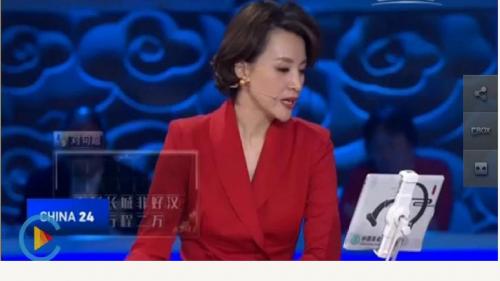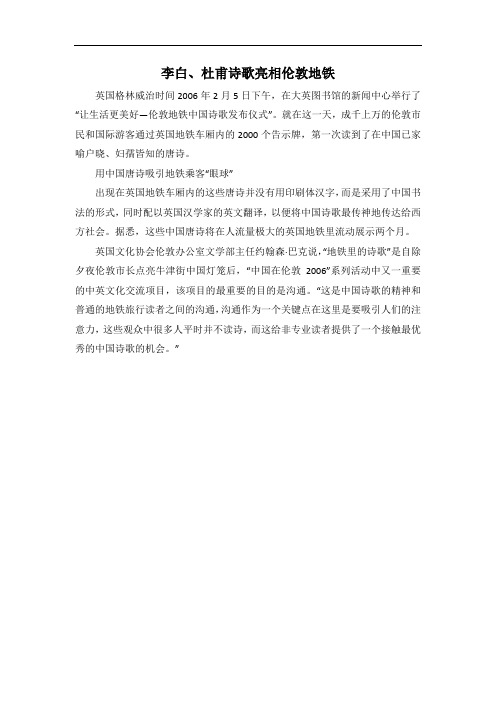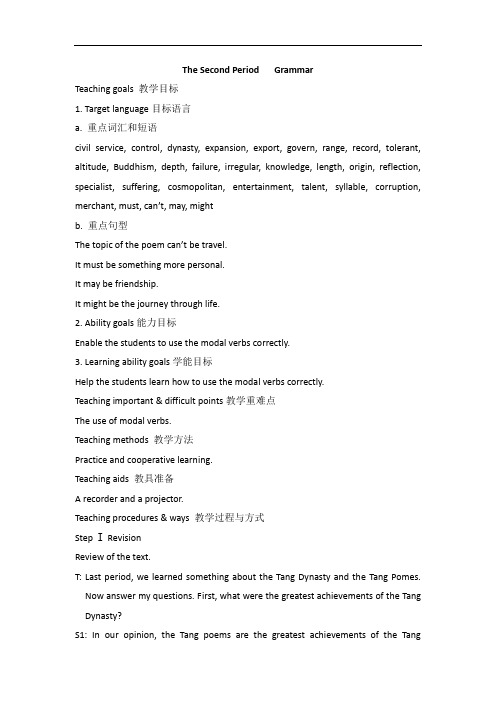英语周报2016-2017学年高二外研版选修八:Module 6 课件 Grammar 精品
外研版高中英语选修8 Module 6《The Tang Poems》(Period Two)ppt课件

(2)Tom was caught drive that fast again.
A
yesterday and he
not to
A.speeding;was cautioned B.to speed;was cautioned C.speeding;warned D.to speed;warned
解析 句意为:昨天汤姆超速被抓了个正着,他被警告不要再 开那么快了。catch sb.doing sth.撞见某人正在做某事,故排除 B、D两项。caution/warn sb.not to do sth.告诫某人不要做某 事;C项中warn应用被动形式。
本 课 栏 目 开 关
课堂讲练互动 7C中小学课件
2.correspond v.通信;相似,相等;符合 [归纳拓展] correspond with与……通信 correspond with/to相等;符合 correspondence n.通信;信件;相当;相似处 [语境助记] (1)Are you still corresponding with your parents? 你一直在和你父母通信吗? (2)Does the name on the envelope correspond with the name on the letter inside? 信封上的名字与里面信上的名字是否相同?
本 课 栏 目 开 关
课堂讲练互动 7C中小学课件
[题组训练] (1)The class caters for all ability ranges. 这个班对各种不同水平的人都适合。 (2)Varieties of programmes in the TV station A.cater to C.apply to
高中英语(外研版)选修八 Module 6 The Tang Poems课件 (4) (1)

In the beauty of its ____ and the ____ of topics, Tang poetry was better than anything that had come before it. A good ____ had a better chance of getting a good job. So lots of people became interested in poetry. One of the greatest of the Tang poets was Du Fu.
•(F) 4. In the Tang Dynasty a large number
of people were fond of poetry only because they enjoyed reading and writing poems. •( ) 5. Du Fu’s poems were very popular F among government officials and he was considered to be a talented poet before he died. •( ) 6. Du Fu and Li Bai shared the same style F of writing poetry.
Reading comprehension Ⅲ
Fill in the blanks according to the text.
The Tang _____was one of the greatest dynasties in Chinese history. Trade with foreign countries created a _____ and ___ culture. Persians, Arabs and Jews came to live in China, bringing with them their own ____ and _______.
英语周报2016-2017学年高二外研版选修八:Module 6 教

附件Ⅰ. 课文注释与疑难解析1. Persians, Arabs and Jews came to live in Chinese towns, bringing with them their own religions and customs.波斯人、阿拉伯人和犹太人带着自己的宗教和风俗来中国的城镇居住。
句中bringing with them ... 是现在分词短语做伴随情况状语。
用何种分词在句子中作状语,取决于分词与句子主语的逻辑关系:主谓关系用现在分词,动宾或被动关系用过去分词。
Not shavings enough hands, we turned to them for help.Although working very hard, he failed to pass the final exam.2. They were allowed to live in communities governed by their own laws, and to keep their traditional forms of entertainment such as music and dance, which influenced the development of Tang culture.他们都被获准生活在由自己的法律管辖的社区内,他们还可以保留自己传统的诸如音乐和舞蹈等娱乐方式,这些都对唐文化的发展有一定的影响。
句中governed by their own laws是过去分词短语作定语。
To live in ...与to keep ...是两个并列的动词不定式,作allowed的宾语。
3. It is said that he drowned when he fell into a river while trying to take hold of the reflection of the moon.据说他在设法抓住河里月亮的倒影时掉进河里溺死了。
英语周报2016-2017学年高二外研版选修八:Module 6 试

Part 1 INTRODUCTION, READING ANDVOCABULARY (1) & READING AND WRITING (2)I. 根据下面各句句意以及所给单词的首字母或汉语提示词,写出该单词的正确形式(每空一词)。
1. Stress has an effect on both your physical and m________ health.2. As the sun set, the ________ (影子) of the tall building became larger.3. There's no doubt that a war can cause terrible human ________ (苦难).4. The aircraft which carries goods is flying at an a________ of 20,000 feet.5. Her ideas were large: if she could not succeed, she would at least be a heroicf________.6. A________ is the scientific study of the stars, planets, and other natural objects in space.7. We need more money if we are to make any further ________ (进展) in this area of science.8. Xi'an, a city in the northwest of China, was the capital of many d________ in Chinese history.II. 选用方框内合适的短语并用其正确形式填空(每个短语限用一次)。
外研版高二英语选修8_外研版高二英语选修8_Module6_Grammar精品课件

May和might的用法
1. may, might 表示推测“可能性”时,意思是“可 能”、“也许”, 语气上不是太肯定。
※ He may / might be in his office now. = It is possible that he is in his office.
※ She would not go to the dentist even though she was in considerable pain.(意愿)
※ When my parents were away, my grand mother would look after me. (习惯性)
after his death.
※ 情态动词+have +过去分词用来表示对发生在过 去的事情的推测。
情态动词表推测的用法:
※ 情态动词中的must, can, could, may, might 都可以用 来表推测。
※ 在肯定句中,must 的可能性最大,can / could 次之, may / might最小。
Must表示推测时的用法
4、在含有must的反意疑问句中,疑问部分的助动 词根据实际情况而定:
※ He must be an actor, isn’t he? (表现在 )他一定是个演员,对吗? ※ She must have met a fairy, hasn’t she?
(表完成)她一定遇到仙女了,是吗? ※ It must have rained last night, didn’t it?
※ The boys shouldn’t be playing football at this time. They should be at school. 孩子们这个时候不该在踢足球,他们应该在学校上 学。(表可能性)
外研版高中英语选修八课件:Module+6 The+Tang+PoemsSection+Ⅲ .ppt

11.突然 __a_l_l_a_t_o_n_c_e______ 12.背诵 _re_m__e_m_b_e_r_/l_e_a_rn__.._.b_y heart 13.从事,占据,拿起 ___t_ak_e__u_p________ 14.不管……还是…… _w__h_e_th_e_r_._.._o_r_.._.___ 15.处理,对付 __d_e_a_l_w__it_h_______ 16.如果……该多好 ___if_o_n_l_y_._.._______ 17.瞥一眼 ____g_la_n_c_e_a_t______ 18.approve of sth. _赞__成__某__事__,__满__意__某_ 事 19.a chorus of __异__口__同__声__的______ 20.take on __呈__现__;__雇__用______ 21.cater for _满__足__…__…__的__要__求___ 22.correspond with __与__…__…__通__信______
She has proved herself(to be) an honest and kind-hearted girl. 她的表现已证明她是一个正直善良的姑娘。
It is impossible to prove that God exists. 无法证明上帝存在。
Your computer experience shoul
新知识·预习探索 Ⅰ.词汇热身 1._d_is_o_r_d_e_r_ n. 混乱,失调;紊乱 2.a_p_p_r_o_v_e__ v. 赞成;同意 3._e_x_p_e_n_se__ n. 费用 4._c_a_u_t_io_n__ v. 警告;劝……小心 5._d_o_n_a_t_e__ v. 提供;捐 6._d_e_c_o_r_a_te_ v. 装点;美化 7.in_d_e_p_e_n_d_en_cne. 独立 8.im_a_g_i_n_a_ti_o_n n. 想象;空想 9._ty_p_i_c_a_ll_y_ adv. 典型地,有代表性地;向来;一向 10._r_ef_l_e_ct___ v. 反映,显示;表达
外研版选修八 Module 6 Language points教学课件

4. He was suffering from some form of mental disorder _______ (order) these years. 5. I’ll take the blame for the _______ failure (fail) of the project because I was in charge. 6. Painkilling drugs were not enough to relieve her ________ suffering (suffer). 7. A person guilty of __________ corruption (corrupt) will be brought to court in time.
5. Cultural development went hand in hand with technological progress. hand in hand 手拉手;联合起来 Students stand hand in hand in a row. Corruption and crime go hand in hand.
代词时,可以用that也可以用who)
直到昨天,那个小男孩才意识到 他 yesterday that the
little boy realised he was cheated.
1. It was not until I came here _____ B I realized this place was famous for not only its beauty but also its weather. A. who B. that C. where D. before 2.— Was it by cutting down staff _____she D saved the firm? — No, it was by improving work efficiency. A. when B. what C. how D. that 3. It was 80 years before Christopher Columbus crossed the Atlantic _____ B Zheng He sailed to East Africa. A. when B. that C. after D. since
【最新】高中英语选修八(外研版)课件:Module 6 The Tang Poems6.2.ppt

②He can’t(couldn’t) be over sixty. 他不可能超过了六十岁。 ③How can you be so careless? 你怎么这么粗心? (3)比较委婉、客气地提出问题或陈述看法。 ①Can(Could) you lend me a hand? 帮我一把好吗? ②I’m afraid we couldn’t give you an answer today. 恐怕我们今天不能给你答复。
She may not know about it. 她可能不知道这件事。 (3)may可以表示祝愿。 May you succeed! 祝你成功!
即学即用
写出句中画线词的用法 (1)Life is unpredictable;eventhe poorestmightbecomethe richest. (2)Youmayfeel allthetraining a waste of time,but I’m a hundred percent sure later you’ll be grateful you did it. (3)—I left my handbag onthetrain,but luckily someone gave it to a railway official. —How unbelievable to get it back!I mean,someone might have stolen
英语周报2016-2017学年高二外研版选修八:Module 6 背

济慈简介济慈(1795 –1821)英国浪漫派诗人。
生于伦敦。
父母早逝,由外祖母抚养。
曾学医,并考得内科医生执照,但很快放弃医学,专心从事文学创作。
1816年在亨特主编的《检察者》先后刊载十四行诗《孤寂》和《初读查普译荷马史诗》。
1817年出版第一部诗集,其中有《睡眠与诗》等佳篇。
1818年在照料患肺病的弟弟托姆期间写成取材薄伽丘《十日谈》的叙事诗《伊萨贝拉》。
同年5月发表《恩底弥翁》,长诗描写希腊神话中月亮女神与凡人恩底弥翁相爱的故事。
因他与亨特关系甚密,长诗受到反对亨特的三家杂志的攻击,但他自信死后“定能名居英国诗人之列”,遂开始写作以希腊神话中新、旧神争斗为题材的史诗《许佩里翁》。
1819年写成长诗《圣爱格尼斯之歌》,表达了对弟弟托姆去世的哀悼和对与女友芳妮·布劳恩关系的忧虑,同时写出《夜莺》、《心灵》、《哀感》、《希腊古瓮》、《梦》、《无情的美人》、《灿烂的星,愿我能似你永在》、《秋颂》等一系列优秀诗篇,并开始写作以蛇化美女的神话为题材的抒情诗《莱米亚》,与布朗合写剧本《奥托大帝》。
他的诗以色彩表现感觉,对后来的诗人,包括唯美主义和意象派诗人产生过很大影响。
夜莺颂我的心在痛,困顿和麻木刺进了感官,有如饮过毒鸠,又像是刚刚把鸦片吞服,于是向着列斯忘川下沉:并不是我嫉妒你的好运,而是你的快乐使我太欢欣——因为在林间嘹亮的天地里,你呵,轻翅的仙灵,你躲进山毛榉的葱绿和荫影,放开歌喉,歌唱着夏季。
哎,要是有一口酒!那冷藏在地下多年的清醇饮料,一尝就令人想起绿色之邦,想起花神,恋歌,阳光和舞蹈!要是有一杯南国的温暖充满了鲜红的灵感之泉,杯沿明灭着珍珠的泡沫,给嘴唇染上紫斑;哦,我要一饮而离开尘寰,和你同去幽暗的林中隐没:远远地、远远隐没,让我忘掉你在树叶间从不知道的一切,忘记这疲劳、热病、和焦躁,这使人对坐而悲叹的世界;在这里,青春苍白、消瘦、死亡,而“瘫痪”有几根白发在摇摆;在这里,稍一思索就充满了忧伤和灰色的绝望,而“美”保持不住明眸的光彩,新生的爱情活不到明天就枯凋。
外研版高中英语 选修八module6 The Tang poems reading 教学课件共15张PPT

Chinese poetry are our precious treasure. We should cherish them.
Homework
1. write down your personal essay to retell the passage. 2. write an essay to introduce another Tang famous poet, such as Wang Wei, Meng Haoran, Li Shangyin, Du Mu etc.
Printing
culture
(two aspects )
Tang's influence on others
(Japan and Korea)
Seng Yixing
Part 2(Para.4) Introduction of the Tang poems
Tang poetry was so great, why? Because of the beauty of its images and the range of its topics. How did this happen? (1)An explosion of talent (2)the appearance of new forms (3) A good poet had a better chance of getting a good job.
Para.1 Para.2 Para.3
Para.4
Para.5 Para.6
background of the Tang poems
introduction of the Tang poems
two famous poets of theTang poems
外研版高中英语选修8 Module6 Introduction精品课件

The Chinese translation of the poem
Choose correct answers
1. The poet’s friend is ________. A. a close friend B. an acquaintance
2. The poet is saying farewell because______ A. his friend is going away B. he is going away from his hometown
Blue mountains bar the northern sky; White river girds the eastern town. Here is the place to say goodbye; You’ll drift like lonely thistledown. With floating cloud you’ll float away; Like parting day I’ll part from you. You wave your hand and go your way; Your steed still neighs “Adieu! Adieu!”
3. The mood of the poem is ________ A. happiness B. sadness and regret
Fill in the blanks
1. The images the poet use from the nature: ___c_o_lo_r_o_f_t_h_e_s_k_y__an_d__t_h_e_r_iv_e_r__________ 2. The rhymes in the poem: [_a_i_];__[_au_]_;_[_e_i]_;_[_ju:] 3. The words of parts of the words which create the
英语周报2016-2017学年高二外研版选修八:Module 6 背

李白、杜甫诗歌亮相伦敦地铁
英国格林威治时间2006年2月5日下午,在大英图书馆的新闻中心举行了“让生活更美好—伦敦地铁中国诗歌发布仪式”。
就在这一天,成千上万的伦敦市民和国际游客通过英国地铁车厢内的2000个告示牌,第一次读到了在中国已家喻户晓、妇孺皆知的唐诗。
用中国唐诗吸引地铁乘客“眼球”
出现在英国地铁车厢内的这些唐诗并没有用印刷体汉字,而是采用了中国书法的形式,同时配以英国汉学家的英文翻译,以便将中国诗歌最传神地传达给西方社会。
据悉,这些中国唐诗将在人流量极大的英国地铁里流动展示两个月。
英国文化协会伦敦办公室文学部主任约翰森·巴克说,“地铁里的诗歌”是自除夕夜伦敦市长点亮牛津街中国灯笼后,“中国在伦敦2006”系列活动中又一重要的中英文化交流项目,该项目的最重要的目的是沟通。
“这是中国诗歌的精神和普通的地铁旅行读者之间的沟通,沟通作为一个关键点在这里是要吸引人们的注意力,这些观众中很多人平时并不读诗,而这给非专业读者提供了一个接触最优秀的中国诗歌的机会。
”。
高中英语外研版选修8课件:Module6SectionⅢ IntegratingSkills

face ...
...
处理 面对面 沉溺于…… 一瞥;扫视
赞成 呈现 满足……的要求 与……通信
【答案】 1.all 2.by 3.away 4.on 5.fun 6.with 7.to 8.to 9.at 10.of 11.on 12.for 13.with
根据提示补全下列教材原句
1.Poets use language as a way of expressing their feelings,
(1)with caution (2)caution sb.against sth. =caution sb.not to do sth. (3)cautious adj. be cautious about
小心地
警告某人不要做某事 十分小心的;谨慎的 对……很小心
①We were cautioned not to drive too fast. 我们被提醒车不要开得太快。 ②Statistics should be treated with caution. 对待统计数字要小心。 ③I cautioned him against going there. 我警告他不要去那里。 ④You should be cautious(caution)as the road is frozen. 路面结冰了,你应该小心。
positive
ones of love,happiness and hope,
negative feelings like anger and fear.
诗人把语言作为一种表达自己感受的方式,不管是爱、快乐和希望这些积
极的感觉,还是愤怒和恐惧这些消极的感觉。
2.
people could see me inside.
【最新】高中英语选修八(外研版)课件:Module 6 The Tang Poems6.4.ppt

写作指导 常用表达 写作模板 针对训练
假设你是交换生李华,你所在的美国学校的校报设有“中国唐诗”专 栏。请你给该专栏写一篇100词左右的英语短文,介绍李白的《静 夜思》的内容及其影响。
写作指导 常用表达 写作模板 针对训练
答案 Li Bai’s Night Thoughts is one of the most well-known Tang poems in China. The poem describes a vivid picture for readers.On a quiet night,the poet is lying on the bed.Seeing so bright a gleam on the feet of his bed,he wonders if it’s frost.Lifting his head to look,he finds that it is bright moonlight.Sinking back again,he begins to miss his home. The poet uses simple but beautiful words to express his homesickness,which has touched those who travel far away from home.Today when people feel homesick,they often quote the poem to express their feelings.
• 9、春去春又回,新桃换旧符。在那桃花盛开的地方,在这醉人芬芳的季节,愿你生活像春天一样阳光,心情像桃花一样美丽,日子像桃子一样甜蜜。 2020/12/172020/12/17Thursday, December 17, 2020
英语周报2016-2017学年高二外研版选修八:Module 6 教

The Second Period GrammarTeaching goals 教学目标1. Target language目标语言a. 重点词汇和短语civil service, control, dynasty, expansion, export, govern, range, record, tolerant, altitude, Buddhism, depth, failure, irregular, knowledge, length, origin, reflection, specialist, suffering, cosmopolitan, entertainment, talent, syllable, corruption, merchant, must, can’t, may, mightb. 重点句型The topic of the poem can’t be travel.It must be something more personal.It may be friendship.It might be the journey through life.2. Ability goals能力目标Enable the students to use the modal verbs correctly.3. Learning ability goals学能目标Help the students learn how to use the modal verbs correctly.Teaching important & difficult points教学重难点The use of modal verbs.Teaching methods 教学方法Practice and cooperative learning.Teaching aids 教具准备A recorder and a projector.Teaching procedures & ways 教学过程与方式Step Ⅰ RevisionReview of the text.T: Last period, we learned something about the Tang Dynasty and the Tang Pomes. Now answer my questions. First, what were the greatest achievements of the Tang Dynasty?S1: In our opinion, the Tang poems are the greatest achievements of the TangDynasty.T: I think so. Next question, what made Tang poetry so great?S2: We think that Tang poetry can present the beauty of its images and cover a wider range of topics than any other literary forms.T: Right, then the third question. Which Tang poets do you know, and which do you like best?S3: We know a lot of Tang poets such as Li Bai, Du Fu, Bai Juyi, Wang Zhihuan and Wang Bo. We like Wang Bo best because his poems are very beautiful.T: I know. Now the next question: Which modern Chinese poems do you like?S4: Our group like the poem “Farewell, Cambridge (再别康桥)” by Xu Zhimo(徐志摩)best.Then show the following. Ask the students to fill in the blanks with the words in the passage.The Tang Dynasty is one of the greatest dynasties in Chinese 1 when the Chinese culture and foreign cultures influenced 2 3 . Cultural development went 4 with technological progress and literature such as poetry. The people who could write good poems were more 5 to become government officials. Of many poets Li Bai and Du Fu were the greatest. Although their poem styles were quite 6 , it still di dn’t prevent them 7 becoming two good friends.Sample answers:1. history2. each3. other4. together5. likely6. different7. fromCheck the answers to the activities on Page 74.Step ⅡGrammar (1)Show the following.1. The beggar must be very poor.2. The beggar can’t be very rich.3. The beggar may/might be good at playing the violin.T: Please look at the picture and pay attention to the following sentences. Look at the first sentence. Because we are sure that the beggar is very poor, we can use “must”. In the second sentence, we can find the word “can’t” because we are sure that the beggar isn’t rich. As for the third sentence, we are not very sure whether the beggar is good at playing the violin or not. As a result, we use the modal verbs “may” and “might”. Look at the following slide and pay attention to the usage of the differences between modal verbs: must, can’t, may, might, may not and might not. Do you know the differences between them?Show the following.may not / might not(否定、无把握)┃can’t(否定、有把握)may / might(肯定、无把握)must (肯定、有把握)PracticeAsk the students to finish Activities 1-5 on Pages 75-76. Check the answers with the whole class.Sample answers:Activity 1:1. They express opinions, not facts.2. Sentence a and sentence b.3. I think sentence c and sentence d.4. The modals may and might have the same meaning.5. I think must and can’t have the opposite meanings.Activity 2:The mountains must be faraway.The river may / might be very clear.The town must be very beautiful.The friend can’t be very happy.The meaning of the poem must be very clear.Step Ⅲ Grammar (2)Show the following.1. Would you like to open the door? (Request)2. Could you open the door? (Ability)3. You shouldn’t have opened t he door.(Blame)4. Would you please close it now? (Request)T: Please pay attention to the differences between them. From the above we can see clearly that “would” is used to mean a request, while “could” is used to ask about one’s ability and “should” is used to give advice. Now let’s do Activities 1-3 on Pages 78 and 79.Check the answers with the students.PracticeAsk the students to finish the activities in Grammar on Pages 121 and 122. Then check the answers with the students.Step Ⅳ HomeworkAsk the students to complete the following passage.Waiting for the Metro in Paris is a lot more pleasant nowadays, thanks to a project orchestrated by transit officials.As Jim Bittermann reports, it brings a whole new concept to the term “underground music”.It may be rush hour in the Paris underground, but these days down here there are good reasons to slow down a little when commuting is more than just getting from A to B, when the transit 1___________ be too rapid.Increasingly, the underground tunnels Parisians know as the Metro echo with music worth being late for. That wasn’t, and even today, isn’t always the case. There’s never a shortage of those risking starvation by attempting to sing for their supper, and there’s always someone to appreciate an artist struggling.In the past, without much success, authorities periodically 2____________ triedto eject the would-be musicians who inflict themselves on the travelling public. But with their numbers continually growing, the situation seemed to be getting out of hand.Transit officials came to the conclusion that if they 3_____________ not beat the musicians at their game, perhaps they 4__________ perhaps join them, or at least organize it a little better. So just over a year ago, they set up auditions to select the 300-or-so performers who 5________________ become the official underground musicians of Paris.And it is now an ongoing process. Every six months, all the officially sanctioned musicians, minus those who 6____________ found real work and plus those looking for an underground gig, 7___________ appear at a Metro audition.Antione Nazo, a one-time guitar player himself, videotapes them all for approval by a music committee. “We 8_________ not have the pretension that we 9_____________ s electing music virtuosos.”Nazo says. “We just put ourselves in the shoes of the riders. We want good quality music, not too aggressive, and as diversified as possible.”Diversification 10_______________ never been a problem in Paris. A city which, as a current exhibition on street musicians plainly illustrates, has more than two centuries of encouraging the artists who work its boulevard.For those selected to be the Metro’s officially sanctioned performers, there’s a badge which ensures they 11________________ work uninterrupted by transit authority police, and which often guarantees a good spot in a busy metro station, which some musicians, when the mood of the travelling public is right, 12_____________ mean as much as 600 euros a day in income.Of course, that 13_______________ not happen every day to everyone. But many down here are not looking for a fortune.Paul Suzan said that “the people play here because they first of all, love the music. But it keeps you in shape and gives you some pocket mo ney”.After a year in operation, Metro authorities believe their official musicians 14__________ raised the quality of underground performances and the mood of thetravelling public, and prove that there’s more than one way an underground 15____________ move people.Key:1. can2. have3. could4. should5. would6. have7. must8. do9. are 10. has 11. can 12. can13. does 14. have 15. can。
- 1、下载文档前请自行甄别文档内容的完整性,平台不提供额外的编辑、内容补充、找答案等附加服务。
- 2、"仅部分预览"的文档,不可在线预览部分如存在完整性等问题,可反馈申请退款(可完整预览的文档不适用该条件!)。
- 3、如文档侵犯您的权益,请联系客服反馈,我们会尽快为您处理(人工客服工作时间:9:00-18:30)。
【注意】 may 暗含的可能性_较__小___,must 暗含 的可能性__较__大___。
5) must的简短回答: e.g. Must I clean the dining room at once? 我必须马上打扫餐厅吗? –Yes, you must. – No, you needn’t. – No, you don’t have to.
2) I think all poems should have rhymes. (e) This sentence expresses an opinion about what is right.
3) You should have asked my dad.
(a) This sentence refers to something which didn’t happen.
3) He was probably a very lonely man. He must have been a very lonely man.
4) One possibility is that he died from alcohol poisoning. He may/might have died from alcohol poisoning.
4) The two men must have been very good friends. (a) They might have been good friends. (b) They were probably very good friends. (c) It is certainly true that they were good friends.
e.g. You must talk to them about their study. 你必须同他们谈谈关于他 们学习的事。
2) 在否定结构中表 “不__许__、__禁__止____”,语 气比较强烈。
e.g. You mustn’t leave here. 你不能离开这儿。
3) 表 “坚定的建议”。 e.g. You must come and see us as soon as you get to Shanghai. 一到上海你就得马上来见我们。
4. Complete the sentences with must, can’t, and may / might.
1) We _m__a_y_/m__i_g_h_t study English poetry next year. I’m not sure yet.
2) Shakespeare _m_u_s_t_ be one of the most famous poets in the world.
1. Do the sentences express opinions or facts? They express opinions.
2. Which sentences suggest the speaker is certain of something? (a) & (b)
3. Which sentences suggest the speaker is not certain? (c) & (d)
the mountains the river the town the friend the meaning of the poem Example: the town It must be / can’t be Beijing.
3. Choose the best e3) He _c_a_n_’t_ have known that people would still be reading his poetry after hundreds of years.
4) Li only left an hour ago. He _ca_n__’t_ have arrived at the office yet.
7) He probably wondered why he failed the Civil Service Examination. He must have wondered why he failed the Civil Service Examination.
8) Perhaps the Civil Service Examination contributed to the success of Tang poetry. The Civil Service Examination may/ might have contributed to the success of Tang poetry.
2) He can’t have been interested in a normal job. (a) He was probably interested in a normal job. (b) Perhaps he was interested in a normal job. (c) He probably wasn’t interested in a normal job.
4. Which two modal verbs have the same meaning? may & might
5. Which two modal verbs have the opposite meaning? must & can’t
must 的用法 1) 表义务, “__必__须____”。
Review of modals : should could would
1. Match the sentences with their interpretations.
1) You should read the poem sometimes. (b) This sentence gives a piece of advice.
5) Du Fu and Li Bai probably had very different personalities. Du Fu and Li Bai must have had very different personalities.
6) Du Fu certainly didn’t have an easy life. Du Fu can’t have had an easy life.
5) Du Fu can’t have known he would become famous after his death. (a) Perhaps he didn’t know he would become famous. (b) He certainly didn’t know he would become famous. (c) He thought it was impossible he would become famous.
1) Perhaps the biggest foreign influence came from India. The biggest foreign influence may/might have come from India.
2) It is possible that Li Bai spoke other languages. Li Bai may/might have spoken other languages.
5. Rewrite the sentences using modal verbs.
Example: The Tang Dynasty was probably one of the most exciting periods in Chinese history. The Tang Dynasty must have been one of the most exciting periods in Chinese history.
“可__以____”的意思。
e.g. You may go now. 你可以走了。
May I use your computer? 我用一下你的电脑可以吗?
2) 回答以may开头的疑问句有如下表达 法: e.g. May I smoke here? 我可以在这儿抽烟吗? – Yes, you may. – Yes, please. – No, you can’t. – No, you mustn’t. – No, you'd better not.
约翰, 我可以用一下你的自行车吗?
May I have a look at your license please, sir?
先生,我可以看一下你的执照吗?
2. Make deductions about these things in the poem Farewell to a Friend. Use must, can’t and may / might.
3) He may have died when he fell out of a boat. (a) He died when he fell out of a boat. (b) Perhaps he died when he fell out of a boat. (c) He probably didn’t die when he fell out of a boat.
3) may和might还可表示可能,might表 示的语气更加委婉、客气。 e.g. Do you think Mr. Jackson may / might be here on time?
4) 在口语中can可以代替may表示许可,但 _c_a_n___较随便,_m__a_y_ 更正式。 e.g. Can I use your bike, John?
